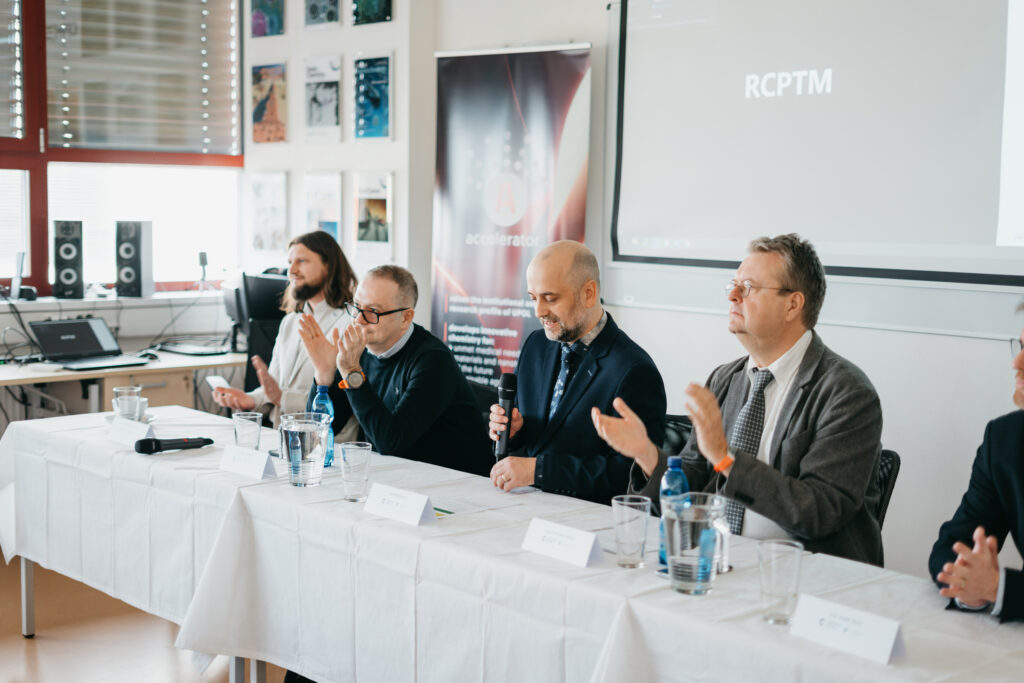World renowned chemist will bring new scientists and research topics to Olomouc
Miniaturization and automation, which lead to sustainable chemistry and at the same time contribute to more efficient development of new drugs, nanomaterials, plant protection compounds or biostimulants, will be the core research topic of a new group led by world-renowned chemist Alexander Dömling. The scientist, who is a leading expert in the field of organic synthetic chemistry and also has extensive experience in translating research results into practice, will build an international team in Olomouc thanks to the ERA Chair ACCELERATOR project, which has been awarded funding of around €2.5 million from the Horizon Europe programme. He is also expected to bring other outstanding scientists to the university, supporting outstanding young researchers, and work closely with commercial partners.
Miniaturization and acceleration of synthetic chemistry are critically important for the rapid optimization of the properties of chemicals under development in pharmaceutical, agrochemical and material research and development. However, in most laboratories, organic synthesis is still performed in a slow, sequential and material-intensive manner and is not validated for multiple substrate combinations. As the principal investigator of a prestigious European project, Alexander Dömling will continue to build the main pillar of his research, which is multi-component organic reactions that allow the preparation and testing of tens of thousands of chemicals at once.
“Sustainability in chemistry is becoming extremely important having to face globalisation and the challenges of an ever-growing world population. And it is in addressing these issues that multi-component reactions can help. I will continue their use in medicinal chemistry, where my colleagues and I will focus on the field of (immuno)oncology and the discovery of new antibiotics or antivirals. In addition, I am looking forward to working with the phenotyping lab here to discover more sustainable plant protection agents as well as biostimulants to promote the production of plants resistant to a wide range of stress factors. Together with CATRIN-RCPTM, we will develop nanotechnologies to discover next-generation materials for a sustainable future,” explained Dömling, who has moved to Haná from the University of Groningen.
It is the emphasis on multidisciplinary research and the linking of all three parts of CATRIN that its director Pavel Banáš welcomes. “The research focus of the new group deepens the synergies between our three research units. I believe that it will not only bring new research topics and attract other, especially foreign, researchers, but thanks to his rich experience it will also strengthen the institutional elements of science and research management in our country. Another goal is to commercialize scientific results more effectively and establish new industrial partnerships,” said Banáš.
According to the Rector of UP Martin Procházka the establishment of a new research group and success in obtaining funds from Horizon Europe programmes always an important step in strengthening the University’s reputation as a major scientific research institution. “Personally, I am delighted by any research project that aims to further progress in medicine and related fields. Developments in this area always have very significant and positive impacts on practice and are good news for doctors and their patients. I wish Professor Dömling and his research group many accomplishments in their scientific work at UP,” added the Rector.
In the past, Alexander Dömling has worked at a number of prestigious institutions, including collaborating with two-time Nobel Prize winner Barry Sharpless at the Scripps Research Institute in California and other scientists who have pioneered ground-breaking “green chemistry” technologies. “I strongly believe that the face of a chemistry lab in industry as well as academia is yet to change fundamentally. Artificial intelligence, automation and miniaturisation methods will find their way into the chemistry of the future. Therefore, the mantra of my lab is that automation plus miniaturisation equals acceleration. The next generation of chemists must be educated accordingly,” Dömling added.

He was intrigued by a meeting with members of the Phenotyping research group of CATRIN, and started thinking about coming to Olomouc. “High-throughput phenotyping, together with my skills in high-throughput chemistry, seemed to me to be an option for solving one of the global problems, namely the need to feed the ever-growing population. After learning about the opportunity to obtain an ERA Chair from the European Union, I applied with Palacký University. Since the beginning of February, I have been working here full time and I am starting to build a research group from scratch. As the problems of the future can only be tackled through international cooperation, I intend to create a group of about 20 enthusiastic and talented students from all over the world,” he said.
The project called ERA Chair for Accelerated Synthetic Chemistry Technologies at Palacký University Olomouc (ACCELERATOR), will run until the end of January 2028. It is a project with the largest financial contribution to UP that the university has received so far from any EU framework programme.

Funded by the European Union under project no. 101087318. Views and opinions expressed are however those of the author(s) only and do not necessarily reflect those of the European Union or the European Research Executive Agency. Neither the European Union nor the granting authority can be held responsible for them.

